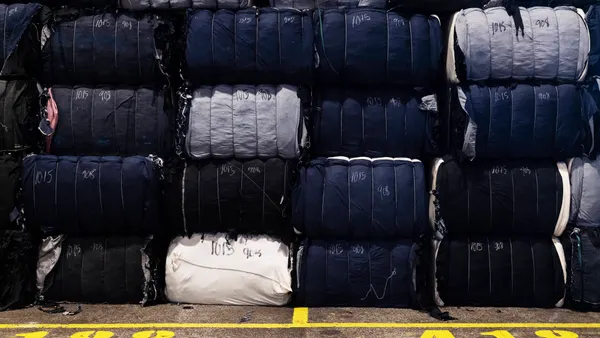Dive Brief:
- California Gov. Gavin Newsom signed the Responsible Textile Recovery Act of 2024 into law this week, making apparel and textile producers responsible for creating a plan to collect, repair and recycle their products.
- The program is meant to divert textiles from residential and commercial waste. The bill, which was first introduced in February 2023, applies to apparel and textile articles that are unsuitable for reuse in their current condition and includes footwear, swimwear, undergarments and handbags, among other products.
- Following the bill’s passage, fashion industry groups such as American Circular Textiles, are calling for similar action at the federal level.
Dive insight:
The law, Senate Bill 707, marks the nation’s first extended producer responsibility, or EPR, program for textiles. California already has similar programs in place for the disposal, management and recycling of solid waste and has stewardship programs for items such as carpets, mattresses, pharmaceuticals and sharps waste.
Now that the bill has passed, recycling and waste groups expect to see fewer textiles entering their facilities, according to Fashion Dive’s sister publication Waste Dive.
The bill specifically calls on apparel and textile producers to form and join a producer responsibility organization, or PRO. The PRO must be approved by CalRecylce pursuant to the requirements of the bill, which includes a complete plan for the collection, transportation, repair, sorting, and recycling, and the proper management of textiles in the state. It would require CalRecycle to approve the PRO by March 1, 2026, and adopt regulations to implement the program beginning July 1, 2028. The PRO needs to submit a plan for collection, repair and recycling of the textiles by July 1, 2030.
In response to the bill’s passage, the American Apparel and Footwear Association is intensifying its relationships with PROs across industries, according to Chelsea Murtha, senior director of sustainability at AAFA. She said the organization is additionally working with other stakeholders and AAFA membership to be in the “best possible position to assist” with PRO formation.
The bill additionally calls on fashion brands to emphasize reuse and repair programs for branded resale. Several brands have implemented or expanded programs such as these this year, including Fjällräven, The North Face and Rent the Runway.
California state Sen. Josh Newman, who authored the bill, said SB 707 is additionally meant to address the environmental impacts of fast fashion “and the ‘throwaway culture’ it has abetted.” In a press release from his office, he pointed to fast fashion as a key driver of the fashion industry’s contribution to carbon emissions.
In 2021, approximately 1.2 million tons of textiles were disposed of in California, despite 95% of them being reusable or recyclable, according to Newman’s release.
The American Circular Textiles and Circular Services Group, which helped shape the bill, called on fashion brands to partner with industry groups to advocate for policies “that [work] for businesses and the environment.”
Rachel Kibbe, the group’s CEO, said SB 707 could help boost circularity efforts on a global scale, due the size of California’s economy.
However, she pushed for regulation on a global level. Without it, she said, the country runs the risk of creating “fragmented and inconsistent regulations across the country.”
“We face the potential of sustainability teams turning focus and resources to compliance, over innovation and true progress,” Kibbe said. “A unified federal approach would streamline the system, prevent disjointed efforts, and better enable businesses to comply across state lines.”











